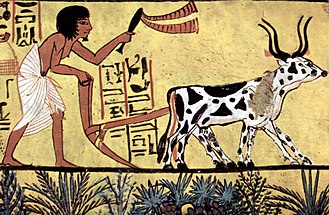
Back الزراعة في مصر القديمة Arabic الزراعه فى مصر القديمه ARZ Земеделие в Древен Египет Bulgarian Labour-douar Henegipt Breton Agricultura de l'antic Egipte Catalan Landwirtschaft im Alten Ägypten German Agricultura en el Antiguo Egipto Spanish Antzinako Egiptoko nekazaritza Basque Agriculture dans l'Égypte antique French Հին Եգիպտոսի գյուղատնտեսություն Armenian

The civilization of ancient Egypt was indebted to the Nile River and its dependable seasonal flooding. The river's predictability and fertile soil allowed the Egyptians to build an empire on the basis of great agricultural wealth. Egyptians are credited as being one of the first groups of people to practice agriculture on a large scale. This was possible because of the ingenuity of the Egyptians as they developed basin irrigation.[1] Their farming practices allowed them to grow staple food crops, especially grains such as wheat and barley, and industrial crops, such as flax and papyrus.[2]